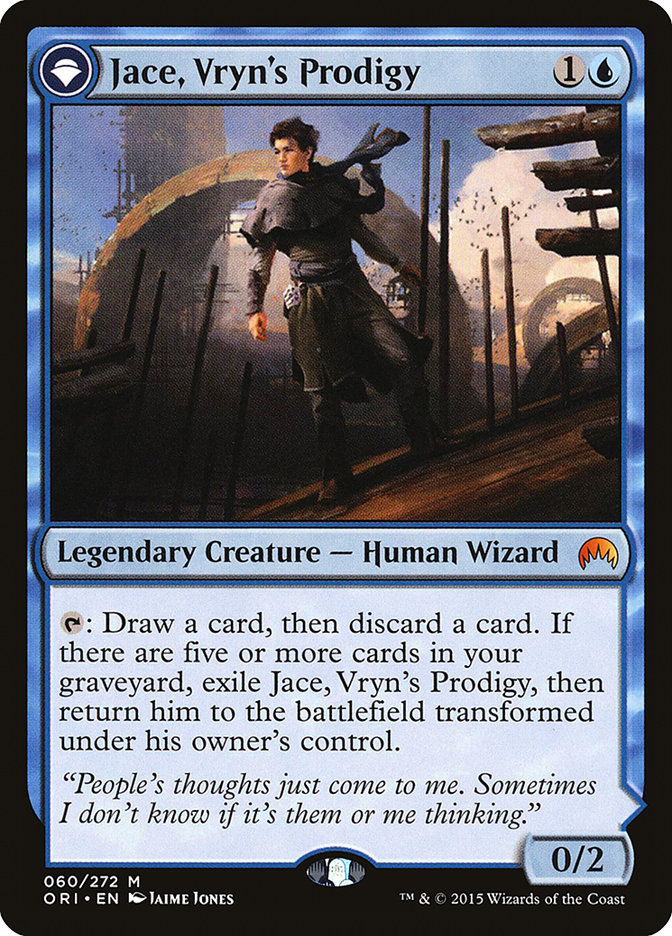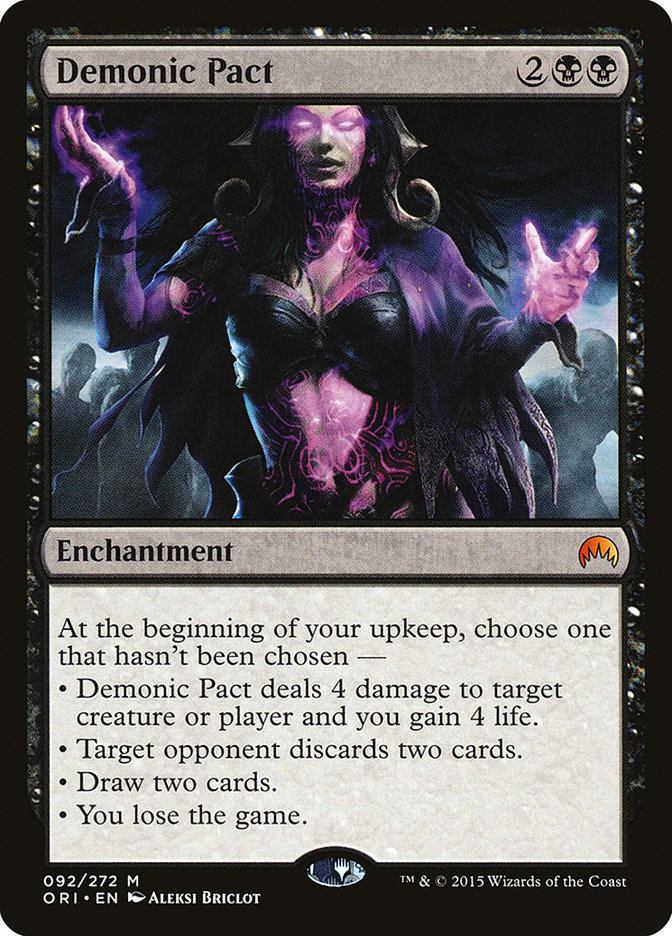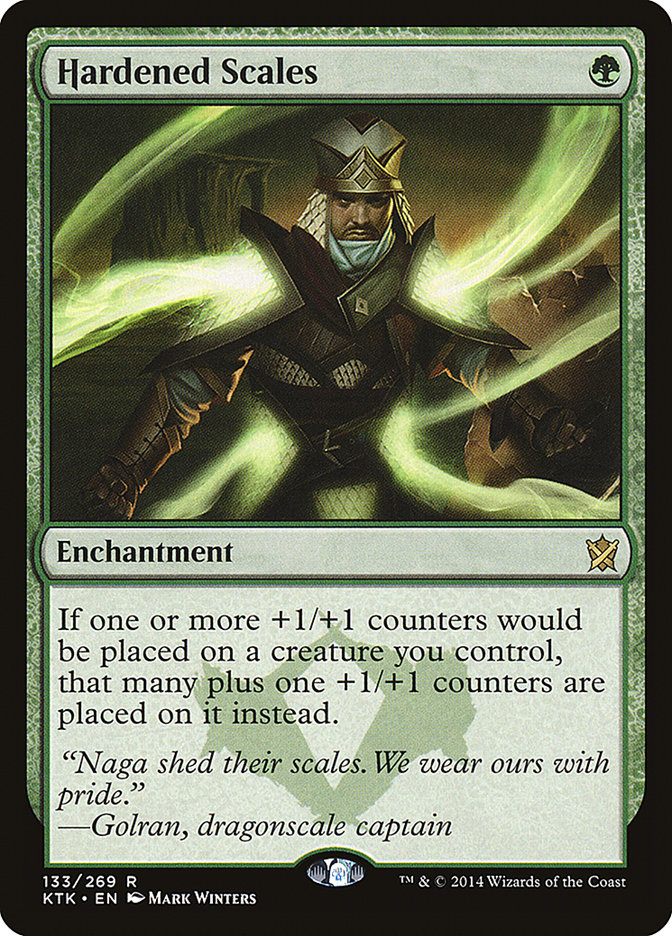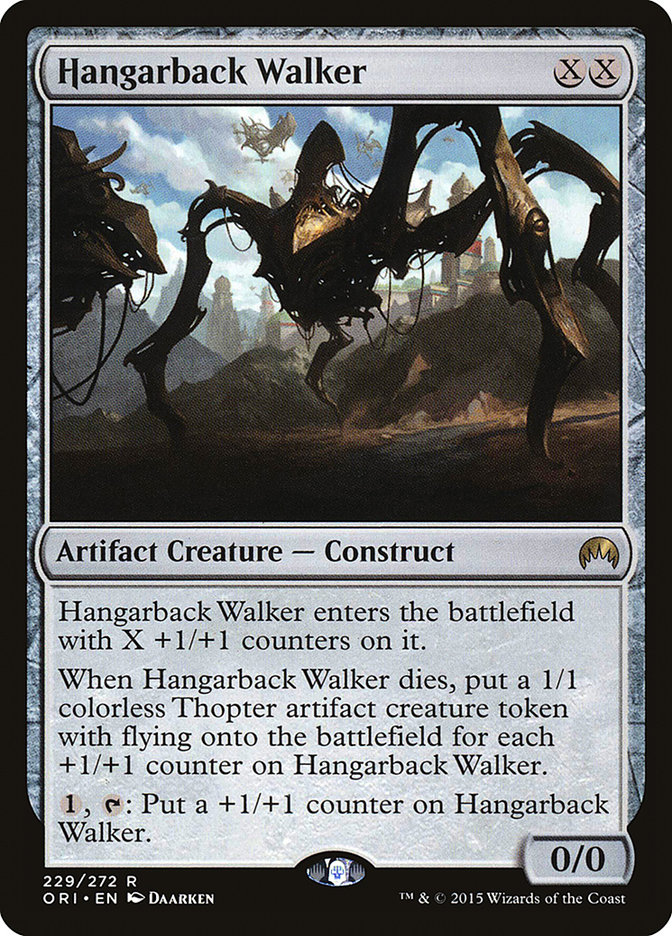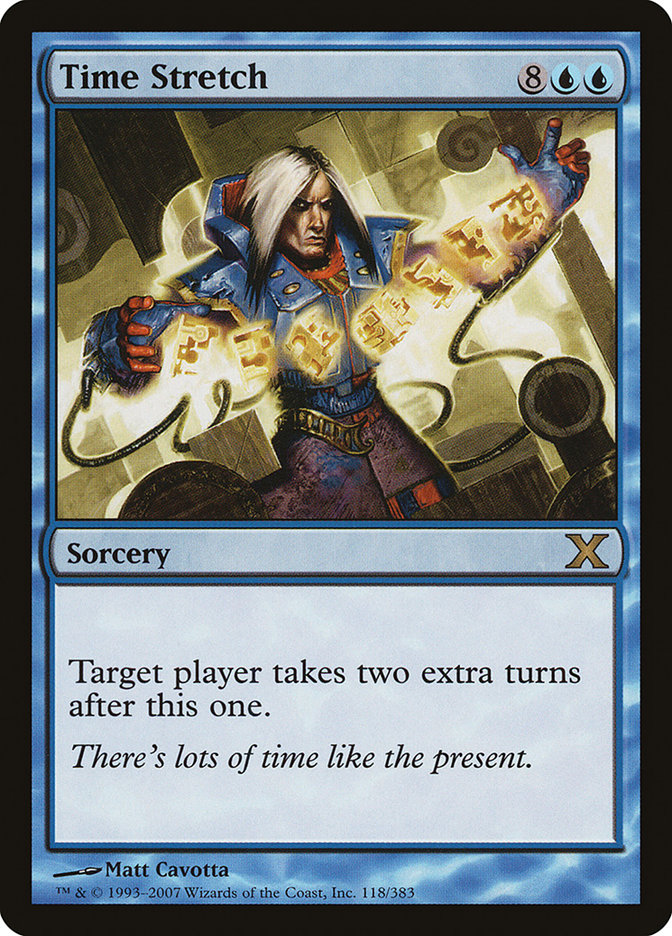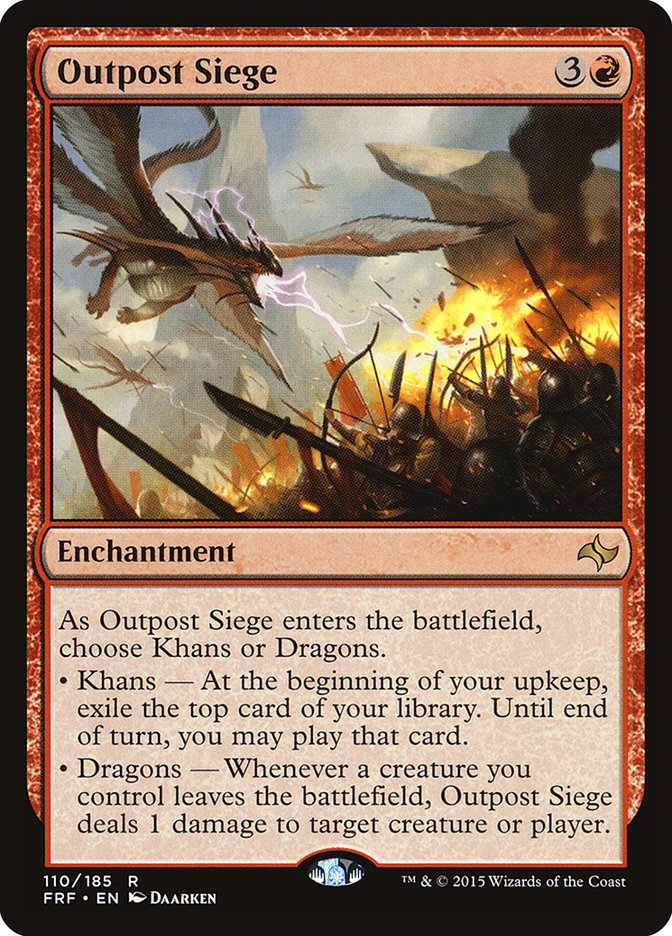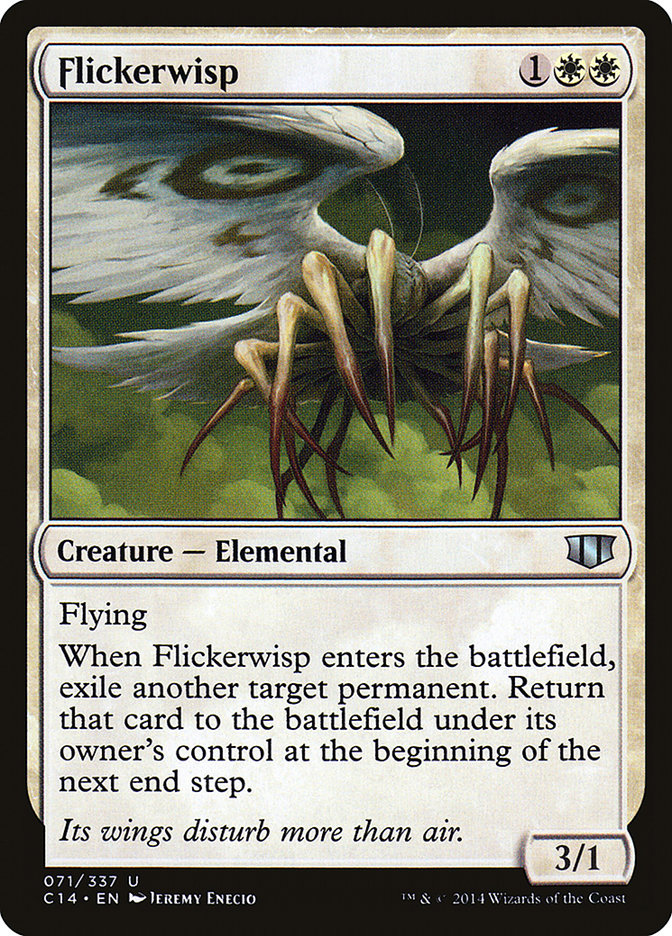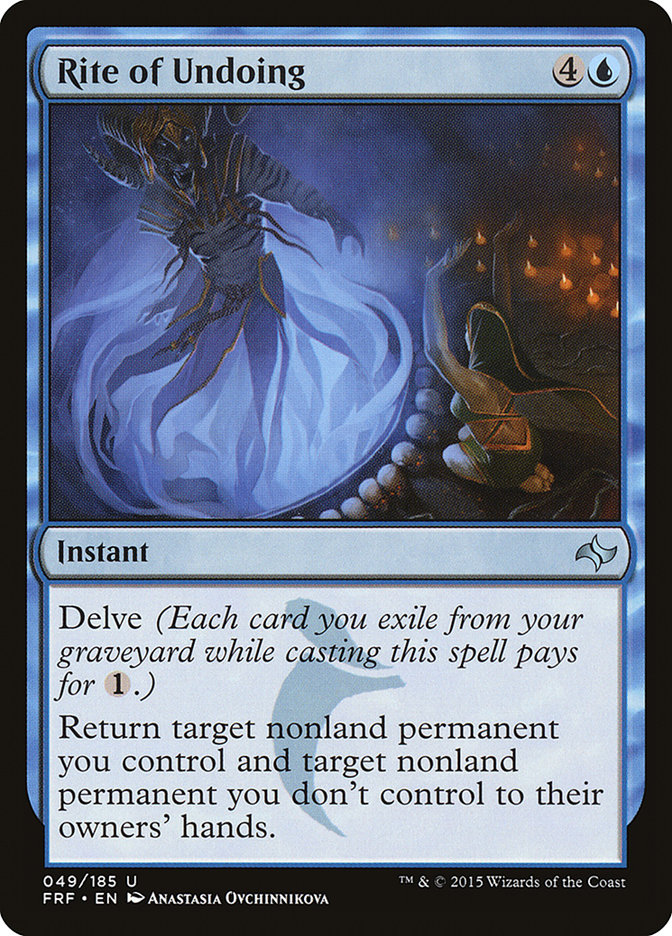Last Saturday, I found myself in an awkward position. I had missed the second day of #SCGCIN as the record setting attendance meant a 6-3 record was no longer good enough. To make things worse, I was wholly unprepared for either Classic the next day. Borrowing Legacy cards on short notice is nigh impossible and I did not like any of the Standard decks.
Enter Michael Majors. At dinner he encouraged me to play a Jace, Vryn’s Prodigy deck, at which point I revealed my secret shame:
I have never registered Jace in a Constructed tournament.
It’s no secret that I like to beat down, and Jace just isn’t really my style. But this event gave me an opportunity to expand my horizons a little bit in a tournament with lower stakes. Majors made me an offer I couldn’t refuse: He would give me a list that he promised was good if I agreed to play it sight unseen.
I would soon come to realize that Michael Majors has a loose definition of the word “good.” Or maybe “promise.” This is the list I was given:
Creatures (7)
Lands (26)
Spells (27)

As you may have gleaned from reading his articles, Majors loves a good brew. Demonic Pact has been a pet card for him ever since Magic Origins was released, even playing it in a nice U/B Control deck in a test draft for that Pro Tour. I should have known something was fishy about his offer, but all of this slipped my mind as I casually made a deal with the devil.
Not one to renege from an agreement, I set about putting the deck together, excited to get my first taste at Jeskai Black, even if it was an unconventional list.
Round one saw me matched up against G/W Hardened Scales, and all was going according to plan as I landed a Demonic Pact, which put me solidly ahead in the first game. I Dispersed it back to my hand when in a commanding position, and with a full grip of removal spells, I declined to take the risk of recasting it, figuring I would find a way to close the game eventually.
At this point, my opponent drew a Hangarback Walker, cast it with five counters thanks to a Hardened Scales, and I looked at the Crackling Dooms and Murderous Cuts that were more than useless. Losing from such a commanding position is rough, but I came in with few expectations and it was only game 1.
I managed to take game 2 with little fanfare, and my opponent’s slow draw in the deciding game left me far ahead once again. Unfortunately, I was unprepared to actually close the game within the time limit and it looked as though we were heading to a draw. On the fifth extra turn, I cast running Painful Truths and now felt insurmountably far ahead as I had multiple answers to Hangarback Walker in hand and a Jace in play. Resigned to my fate, I went for the Hail Mary play of revealing my hand and asking for a concession. To my surprise, my opponent agreed that he could not win and extended his hand in defeat.
This is always a tricky situation to handle. When Magic was more of a niche community and everyone knew everyone else, most players recognized that drawing was a net negative and concessions were somewhat expected. More recently, a different view has emerged where the time limit is viewed as a real part of the game rather than a necessary evil. It simply tests your ability to make difficult decisions in a relevant time frame. If you cannot end the game in time, then you do not meet the criteria for a win.
For me, I would say it is sporting for a player to concede from insurmountably far behind, but in no circumstance are they obliged to, and I would not have blamed or thought less of my opponent had he decided to take his deserved point. It’s a strange balance to strike, but fortunately, it’s one that is often irrelevant given my penchant for fast aggressive decks.
However, today I was playing one of the slowest Standard decks I can recall in recent years. I have gone through a Grand Prix with the Nephalia Drownyard U/B Control deck without so much as going to time. (See, I play control sometimes!) The difference was I was well-practiced with that deck, having tested it for weeks before the event. With that practice comes facility and comfort. I had no such facility with Jeskai Black.
In general I consider myself slightly below average when it comes to pace of play, but I rarely pick up draws because I tend to play fast decks and am good at watching and managing the clock. On Sunday every round was doubled as I had to battle that clock along with my opponent. I won a round in turns solely because my opponent mulliganed down to four cards in game 3. I left a match having won 2-0 but with a scant two minutes left on the clock.
Two of my opponents were kind enough to show up late, thereby receiving a game loss. And in the final round, playing for top 16, I found myself once again entering turn 5 with a huge lead but no way to finish the game that turn. My opponent was once again gracious enough to concede, and I was happy to see that he still finished in the top 32, meaning that his generosity did not cost him anything.
So at the end of eight rounds, I had essentially picked up two draws and came rather close to more than that. At some point during the day I recalled that Roanoke’s resident Jeskai master, Todd Anderson, had played the deck for months and has zero draws. Zero! I talked to him about it and he went further by saying he had only gone to time once in that span. Once! I spent most of the day mystified. I even tweeted about it to spread the gospel of Todd.
Having now played 1 round with the deck, the fact that @strong_sad has 0 draws in 3 months with Jeskai Black is astounding.
— Ross Merriam (@RossMBoss) January 3, 2016
After playing one round with the deck I was astounded by such a feat. After eight rounds, it felt like the most impressive Magic accomplishment of all-time. Kai’s seven Pro Tour wins? Second place.
All this marveling sparked something inside of me, causing me to reexamine my games to see where I could have used less time and avoided putting myself into a position to draw. We cannot all play as quickly as Todd, but there are definitely some things you can do to finish matches on time.
Practice With Your Deck
This one is obvious, as it affects much more than your ability to avoid draws. But in this instance you will want to commit to memory common lines of play or easy shortcuts so that you can focus your time and energy on more important things. You should know by heart how to sequence your fetchlands for various curves and what removal spells are most important to save in a given matchup. Then you can play crisply and leave yourself enough time to think about tough decisions without having to worry about the clock.
I would also recommend you come prepared with appropriate tokens for your deck so you are not scrambling for them when the time comes.
Be Aware of the Clock
You do not have to constantly be checking it, but at the very least you should look over between games. How much time is on the clock after game 1? Is it less than 35 minutes? If so, you may be looking at a long match if it goes the distance. If it is less than 30 minutes, you will likely have to pick up your pace of play.
I prefer to sit in the seat that faces the clock to facilitate this. It only takes a second and it is surprisingly easy to lose track of time, especially in a long, tense match.
Be Aware of Your Opponent
Some people are just slow. Many of them don’t know it. Maybe they don’t play Magic that often or mainly play for fun at home where there is no time limit. At a competitive level event you should have no reservation in asking your opponent to speed up if your concern is legitimate. However, this is easier said than done. It is an admittedly awkward scenario since it can so easily feel accusatory and often times your opponent will not react kindly.
I wish there was better advice than just to do it, but there isn’t. If your opponent refuses to play at a reasonable pace, call a judge. With a shared clock, every extra minute your opponent takes is a minute he or she has stolen from you. As long as you remain composed, you will be fine.
Shortcut Whenever Possible
This is the most important and underutilized tool you have for avoiding draws. For example, rarely should one person be shuffling their deck while their opponent does nothing. Announce your next action immediately and let them consider their response. If all you are doing is casting a Jace, Vryn’s Prodigy after activating a fetchland and passing, you can shuffle while they take their turn. You should be progressing the game whenever possible.
And please, please, please don’t be the person who activates a fetchland, shuffles, presents, then casts Stoneforge Mystic.
Another common place you can shortcut is with discard spells. We all know you want to write down your opponent’s hand, but you should always do it while thinking about which card to take, not after. Never after.
These shortcuts may seem minuscule, but every minute adds up. Doing things like this is often what separates a completed match from a draw. With some practice, these shortcuts will become intuitive and you will rarely be under time pressure.
The Deck
I would like to close with my thoughts on the deck I played. Firstly, I was impressed by how powerful Demonic Pact is. I did lose one game to it after casting it in desperation, but every other time it was a must-counter that would take over the game. The Soul Spike mode is particularly effective against Gideon, Ally of Zendikar, often forcing them to make an emblem or use Gideon’s +1 ability, at which point you can finish it off with a Crackling Doom or Kolaghan’s Command.
Also, if you are flush with bounce spells for the Pact, you can use one to return a troublesome permanent of your opponent’s with the trigger on the stack so as to make them discard it to the Mind Rot mode. Thus, this version of the Jeskai Black deck has a bit more leeway in dealing with planeswalkers and problematic permanents like Outpost Siege.
The downside of this is that the deck is forced to play weak cards like Disperse and raise its curve significantly. Demonic Pact is a four-mana sorcery that has no immediate impact, making it a liability against aggressive decks unless your first three turns were excellent. The inclusion of Silumgar’s Command as another answer to Pact only exacerbates this problem, as the -3/-3 mode was not as relevant as often as I would have liked.
Adding a BB spell in Pact as well as a UU spell in Dig Through Time made the mana significantly worse as well, and I was often caught without white mana or with only a single blue for Dig, making me fall even further behind.
Ultimately, what we have here is a more powerful version of Jeskai Black that is more vulnerable in the earlygame, and that is not a fruitful direction to take the deck. Typical Jeskai Black lists already have an excellent lategame but can be felled quickly by an aggressive deck. The goal in evolving the deck should then be to patch this weakness in the earlygame while maintaining a dominant end game.
While Jeskai Black is not its proper home, I am now intrigued by the potential of Demonic Pact. There is enough good card draw to find the necessary answers to it, so the primary issue to fix is the tempo disadvantage the card represents. This means I want to play it alongside the cheapest spells, especially Duress, which can protect it from a counterspell, Utter End, or Dromoka’s Command.
Since you also lose a lot of tempo on the turn you try to reset Demonic Pact, I would love to pair it with any flicker effect (like Flickerwisp) so I could reset the Pact without having to spend four mana recast it.
It is not quite as good as a flicker effect, but Rite of Undoing can contain the opponent’s board while you recast the Pact and for the potential low price of one mana. Unfortunately, our delve count is already somewhat high with the desire to play Murderous Cut as the most efficient removal spell in the format as well as Dig Through Time for the necessary velocity to set up Pact, but Rite is a potential singleton that will overperform.
Demonic Pact does not have much time left in Standard, but it is a potential sleeper as a powerful card that has not seen the necessary supporting cards for it to succeed. Michael Majors may be getting some company in that rabbit hole he is so fond of exploring.

